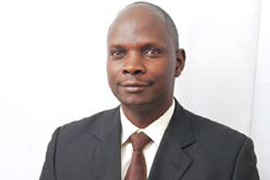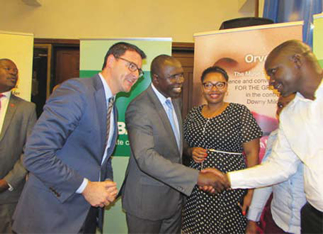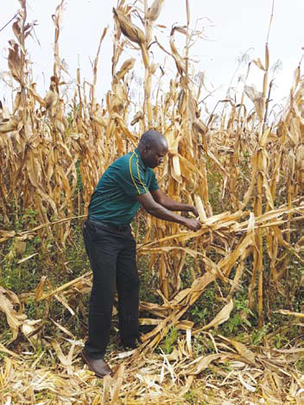Thomas Kipkorir: Visionary and Inspiring
Briefly discuss Thomas Kipkorir (Background and Professional life to your current position)

Thomas is the Country Manager, Crop protection and Public Health business at BASF. Before joining Basf East Africa Ltd, Thomas worked for Amiran Kenya Ltd (2012-2013), as the Cereal Manager in-charge of all large and medium scale farms in Timau, Narok, Nanyuki, Eldoret, Nakuru, Naivasha and all Adventure groups of farms in the country.
Before joining Amiran, worked for Hygrotech East Africa Ltd (2003 – 2011) as the Regional Manager in charge of Western Kenya region in charge of Cereals, Corn, and Coffee, Sugar cane, Ornamentals and vegetables business.
Thomas’s ambition is to be part of a proactive, dynamic, diligent team that defines plans, develops, and provides efficient and effective management strategies to business enterprises. His personal skill includes proven managerial ability, excellent numeric and analytical skills, good organizational skills, excellent interpersonal and leadership skills, ability to manage cross cultural teams. He also has good writing skills, ability to draft projects/research proposals. Thomas has a Master of Science in Agricultural and Rural Development from KeMU, Bachelor of Science in Agriculture (Production Option) and Diploma in Management & Administration from Cambridge, Diploma in Veterinary Science Assistant from Thomson College.
How would you describe your time as Country Manager- Kenya, Crop Protection and Public Health Business? Are you passionate about what you do?
The post of a Country Manager is a great responsibility, but this is also a grand opportunity to demonstrate all I have learned. I am truly passionate about my work because my work fill a large part of my life, and the only way to be satisfied is to do what you believe is great work. And the only way to do great work is to love what you do as famously said by Steve Jobs. It’s my desire to use the skills and knowledge I acquired through training, education and work experience so far, to achieve and surpass organizational goals and objectives while developing the same skills or new ones in response to the challenges the organizations or environment may present in the course of the work.
In a nutshell describe BASF products and services to the farmer

BASF’s Crop Protection division is a global leader in crop protection and a strong partner to the farming industry providing well-established and innovative fungicides (Swing R, AbacusR and Osiris R ) insecticides (Fastac) and herbicides (Stomp CSR, BasagranR and Integrity R). BASF is committed to supporting the farmer discover his potential in farming by offering innovative solutions in crop protection.
BASF offers solutions and not merely products. We are constantly exploring new frontiers in crop protection to meet the demands of the growing world population. Farmers worldwide use BASF’s solutions and services to improve crop yields and crop quality. Other uses include public health solutions, structural/urban pest control solutions, turf and ornamental plants, vegetation management and forestry.
BASF aims to turn knowledge rapidly into market success. The vision of BASF’s Crop Protection division is to be the world’s leading innovator, optimizing agricultural production, improving nutrition, and thus enhancing the quality of life for a growing world population. It is the reason that we celebrate our farmers by recognizing that Farming, is the biggest job on earth. We are supporting agriculture to enable increasing production of enough food for the burgeoning world population estimated to reach 9 billion by 2050. This figure has sent food experts to the drawing board with a warning that current production methods are not compatible with the required high farm productivity. Without technology, food production becomes a herculean task explaining why BASF is supporting farmers to access innovation, solutions and experts to enable them to improve productivity, increase efficiency, and stay at the cutting edge of their profession ensuring growing demands are met, year after year.
Briefly discuss cereal farming in Kenya.
 Wheat farming dates back to the colonial era when Lord Delamere introduced it on experimental basis in Nakuru. Wheat is the second most important cereal grain in Kenya after maize. It is largely done for commercial purposes on both small and large scale farms. Small scale farmers grow wheat in small areas of less than 50 acres and large scale farmers grow on more than 50 acres of land. Furthermore, large scale farmers are more mechanized in wheat production compared to small scale farmers. The large scale farmers dominate wheat production with a share 70% of wheat area and 80% of production. The main wheat growing areas in Kenya includes Narok, Nakuru, Eldoret, Naivasha, Kitale, Nanyuki, Timau, Meru central and Trans Mara.
Wheat farming dates back to the colonial era when Lord Delamere introduced it on experimental basis in Nakuru. Wheat is the second most important cereal grain in Kenya after maize. It is largely done for commercial purposes on both small and large scale farms. Small scale farmers grow wheat in small areas of less than 50 acres and large scale farmers grow on more than 50 acres of land. Furthermore, large scale farmers are more mechanized in wheat production compared to small scale farmers. The large scale farmers dominate wheat production with a share 70% of wheat area and 80% of production. The main wheat growing areas in Kenya includes Narok, Nakuru, Eldoret, Naivasha, Kitale, Nanyuki, Timau, Meru central and Trans Mara.
Wheat production has however declined over the years due to high production costs, high capital costs, lack of credit for production, and the low level of technology-adoption in wheat production. Kenya has had to rely on wheat imports to meet the and regional demand for wheat and wheat products. Increased wheat imports have led to further decline in wheat production because imports dampen domestic prices, which disincentive to production. Kenya’s exports of wheat products have also faced increased competition because of the high cost of domestic wheat. These factors combined could lead to collapse of the domestic manufacturing industry and consequently loss of employment and livelihood of many Kenyans.
Where do you see the cereal sector globally in the next 5 and 10 years from now?
How is BASF prepared for this change in the industry? Cereal sector space is diminishing due to exponential population growth rate which reduces production land for settlement purposes. And also climate change is an issue. At BASF, we create chemistry for a sustainable future. We combine economic success with environmental protection and social responsibility.
Lately we have seen a more aggressive Cereal sector, what can you attribute this to?
The Common Market for Eastern and Southern Africa (COMESA) region, with a population of about 400 million people, provides a large market for Kenyan wheat products.
Where do you think the most significant growth will occur in the cereal sector in the next few years?
The main area of growth will tilt towards value addition (processing) and diversification i.e. more use of wheat by – products.
What’s the biggest challenge YOU feel the cereal sector faces, and how do you inspire growers to meet it head on?
Marketing of wheat for better prices in face of stiff import competition. I personally inspire my farmers to form groups or associations to enable them pool together for a better bargaining power.
How do you compare cereal farming in Kenya with the rest of the region and globally?
Kenya has a comparative advantage in the export of wheat products into East and Central Africa region due to well established milling infrastructure and a good transportation network.
Competitiveness of wheat production in Kenya indicates that Kenya does not have a comparative advantage in wheat production compared to major world producers like China, Canada, Australia, Argentina, and United states. It is therefore apparent that with world globalization in trade in wheat and other commodities, domestic wheat production is not competitive and Kenya will have to rely more on imports to meet domestic and regional demand for wheat and wheat products.
What do you think should be the vision for the cereal sector?
The focus and vision on policy should be relaxing constraints in wheat production, manufacturing, and marketing of wheat products in the domestic and regional markets.
What should be the top priorities for the sector for (Growers, Government, Suppliers, and Market)?
The private and public sector have to come together to address factors that hinder productivity and profitability of wheat and wheat products.
What is your personal work ethic, and how does this affect the company culture?
As the common adage goes “Team work allows people to share their ideas, leverage the inputs of different thinking patterns, and discuss the viability of such ideas in the light of diverse experience of the different team members. The results of such joint actions are greater than the result of individual actions taken separately. Thus team work allows people to pool their talent, resources, and insight for mutual benefit.
What decisions have you made in your career that you look back on and feel where mistakes and what have you learned from them?
I used to despise people who criticise me when I decided to pursue a Management & Administration course. But I learnt that criticism is part of learning and growth. It means that you are taking initiatives to learn something new and grow over from your current state. If you are not getting criticised, it means you are not taking enough risk to learn something new and to grow. At present the skill I learnt are very vital in my current role.
Discuss the most pivotal moments in your career that you either learned from and/or that got you where you are?
I know you have heard it a thousand times before. But it’s true – Smart work pays off. If you want to be good, you have to practice, practice, and practice. If you don’t love something, then don’t do it. I am always prayerful, professional, polite, passionate, purpose driven, punctilious, pristine, punctual, promising and above all practical. These has contributed enormously to my growth.
Describe your ordinary day? Do you have enough personal time?
I make sure to be ready and out the door so I can get to work at least 30 minutes before start time, that way if there are delays such as traffic I am still on time for any meetings or important tasks. I check my calendar, then plan my sit down work time around other things like meetings, emails and calls.
I always create quality time for myself after work to relax and to tune out. And do something different. My best ideas often pop-up when I am most relaxed and free thinking mode.
Other than professional service, what else do you extend to the community?
If you allow me to quote Martin Luther King Junior- He once said the greatest question on earth is what have you done for others? Am involved in mentoring young upcoming proffessionals and talking to university students on crop production and crop protection.
Give your final comments.
The best way to not feel hopeless is to get up and do something. Don’t wait for good things to happen to you. If you go out and make some good things happen, you will fill the world with hope, you will fill yourself with hope.